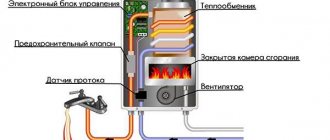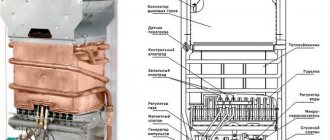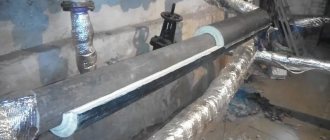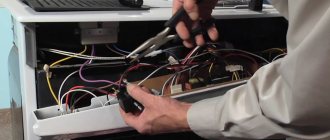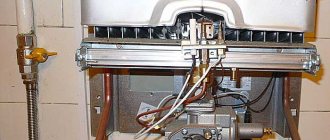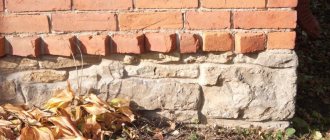Typically, the operation of a gas water heater is accompanied by sounds associated with the burning of a flame and the flow of water inside the device. However, sometimes the user may hear whistling, popping, or other extraneous noise from the equipment. To understand why a water heater can whistle and make noise, you must first learn about the design of this type of water heater, as well as the operating features of gas water heaters.
If, when you turn on the column, you hear a pop, this is a sign of problems with the gas supply.
Each device has a working area in which gas accumulates when the equipment is turned on, as well as its gradual connection with air.
If the volume of accumulated gas and air corresponds to the manufacturer’s calculations, there will be no pops. If gas and air accumulate in excess, it causes a small volumetric explosion.
It not only causes a loud popping sound, but can also damage the chimney, so this situation should be corrected immediately.
The author of the following video offers his solution to this problem. After watching his video, you can independently get rid of the cotton when you turn on the gas water heater.
The cause of noise when heating water is insufficient draft. Therefore, in noisy equipment, it is the first thing to check.
A lit match or lighter is brought to the control holes or a special hatch in the upper part of the column. If the flame deviates towards the device, the draft is sufficient.
Otherwise, care should be taken to clean the chimney duct.
Also, noise can be caused by insufficient air flow into the room, for example, if plastic windows are installed in the kitchen. The seals in such windows interfere with the natural ventilation of the room. In this case, to eliminate noise, you should simply control the air flow.
Another reason the column is too noisy is that the pilot burner wick is dirty. And then to eliminate the noise, it is enough to clean the jets. A similar situation is possible if the jets in the main burner are clogged, then after cleaning it, the hum during operation of the column disappears.
In modern speakers that are turned on using electric ignition, the cause of noise during operation may be as follows:
- Discharged batteries. As a result, the gas-air mixture is difficult to ignite. In such a situation, the batteries need to be replaced.
- Damage to the sensor that controls the water supply. Often its malfunction is caused by oxidation of the contact group. Usually this sensor is not removable, so it is replaced.
- A spark plug malfunction prevents an electric spark from being produced. Most often, it shifts after many heating-cooling cycles. By returning the spark plug to its nominal position, you will restore the possibility of spark formation and eliminate extraneous noise.
- Problem with mechanical ignition retarder. Its presence can be determined after dismantling the assembly and shaking it - normally you should hear the noise of the ball moving inside the moderator. If there is no sound, this indicates that the ball is moving. You can return it to its place using a soft wire.
If a monotonous loud whistle is coming from your equipment, you should first determine where it is coming from. To do this, turn off the gas tap, and then open the hot water tap. Further actions depend on the resumption or absence of “trills”:
- If a whistle appears, its occurrence is associated with the water path. The most common reason for this sound is scale deposits in the heat exchanger or a foreign object getting inside the pipe. At the same time, the performance of the column decreases. In this case, to get rid of the whistling, you need to clean the heat exchanger from scale, and the reverse flow will help wash out the foreign object from the column.
- If there is no whistling sound, the cause of its occurrence was problems in the gas path. Most often they are associated with a defect in the valve that modulates the flame power. Then the whistle appears only at a certain power, and to eliminate it, you need to adjust the power in any direction. Another common cause is a clogged tract. Whistling sounds appear at any power. To identify the location of contamination, you will have to carry out extraordinary cleaning, which is best entrusted to a specialist who works with gas equipment.
After watching the following video, you will be able to clean the heat exchanger from scale yourself, without contacting a professional.
Clap when turned on
If, when you turn on the column, you hear a pop, this is a sign of problems with the gas supply. Each device has a working area in which gas accumulates when the equipment is turned on, as well as its gradual connection with air. If the volume of accumulated gas and air corresponds to the manufacturer’s calculations, there will be no pops. If gas and air accumulate in excess, it causes a small volumetric explosion.
It not only causes a loud popping sound, but can also damage the chimney, so this situation should be corrected immediately.
The author of the following video offers his solution to this problem. After watching his video, you can independently get rid of the cotton when you turn on the gas water heater.
What if the equipment is still noisy?
If, after these manipulations, the gas water heater still ignites with a bang when you turn on the water, then it is better to stop further independent research. In such situations, you will have to seek help from qualified specialists.
They will carry out competent diagnostics of the equipment, will be able to clearly determine what is causing the cotton and, based on the data obtained, will be able to provide you with options for solving the problem.
In certain cases, independent repair is impossible, then cooperation with qualified specialists will be a rational solution.
The speaker hums and makes noise during operation
The cause of noise when heating water is insufficient draft. Therefore, in noisy equipment, it is the first thing to check. A lit match or lighter is brought to the control holes or a special hatch in the upper part of the column. If the flame deviates towards the device, the draft is sufficient. Otherwise, care should be taken to clean the chimney duct.
Also, noise can be caused by insufficient air flow into the room, for example, if plastic windows are installed in the kitchen. The seals in such windows interfere with the natural ventilation of the room. In this case, to eliminate noise, you should simply control the air flow.
Another reason the column is too noisy is that the pilot burner wick is dirty. And then to eliminate the noise, it is enough to clean the jets. A similar situation is possible if the jets in the main burner are clogged, then after cleaning it, the hum during operation of the column disappears.
In modern speakers that are turned on using electric ignition, the cause of noise during operation may be as follows:
- Discharged batteries. As a result, the gas-air mixture is difficult to ignite. In such a situation, the batteries need to be replaced.
- Damage to the sensor that controls the water supply. Often its malfunction is caused by oxidation of the contact group. Usually this sensor is not removable, so it is replaced.
- A spark plug malfunction prevents an electric spark from being produced. Most often, it shifts after many heating-cooling cycles. By returning the spark plug to its nominal position, you will restore the possibility of spark formation and eliminate extraneous noise.
- Problem with mechanical ignition retarder. Its presence can be determined after dismantling the assembly and shaking it - normally you should hear the noise of the ball moving inside the moderator. If there is no sound, this indicates that the ball is moving. You can return it to its place using a soft wire.
Strong buzzing
This sound is associated with a violation of draft in the chimney. First of all, you need to check whether the ventilation duct is working. Bring a lit match to it. If there is a draft, the flame will pull into the hole. If there is no reaction, the chimney is clogged and needs to be cleaned.
Expert opinion
Grebnev Vadim Savelievich
Heating system installer
The humming may be due to a violation of the general ventilation in the room. Absolute tightness is created by closed plastic windows. Therefore, during operation of the column, arrange slot ventilation or open the window slightly.
The speaker whistles
If a monotonous loud whistle is coming from your equipment, you should first determine where it is coming from. To do this, turn off the gas tap, and then open the hot water tap. Further actions depend on the resumption or absence of “trills”:
- If a whistle appears, its occurrence is associated with the water path. The most common reason for this sound is scale deposits in the heat exchanger or a foreign object getting inside the pipe. At the same time, the performance of the column decreases. In this case, to get rid of the whistling, you need to clean the heat exchanger from scale, and the reverse flow will help wash out the foreign object from the column.
- If there is no whistling sound, the cause of its occurrence was problems in the gas path. Most often they are associated with a defect in the valve that modulates the flame power. Then the whistle appears only at a certain power, and to eliminate it, you need to adjust the power in any direction. Another common cause is a clogged tract. Whistling sounds appear at any power. To identify the location of contamination, you will have to carry out extraordinary cleaning, which is best entrusted to a specialist who works with gas equipment.
After watching the following video, you will be able to clean the heat exchanger from scale yourself, without contacting a professional.
Typically, the operation of a gas water heater is accompanied by sounds associated with the burning of a flame and the flow of water inside the device. However, sometimes the user may hear whistling, popping, or other extraneous noise from the equipment. To understand why a water heater can whistle and make noise, you must first learn about the design of this type of water heater, as well as the operating features of gas water heaters.
Scale on boiler parts
Due to the fact that the water is not filtered before it hits the heating elements (read about choosing a filter for heating in a separate article), therefore sediment often remains on the internal surfaces of the gas boiler. Parts gradually lose their functionality. The problems start with the heat exchange elements. Further, sediment forms on the walls of radiators and pipes, this reduces the space through which water should flow. Getting rid of scale is quite simple; just open the gas boiler and clean it using special means. In this case, only the wear resistance of the equipment itself suffers. To avoid such problems in the future, it is enough to carry out periodic preventative cleaning.
Clap when turned on
If, when you turn on the column, you hear a pop, this is a sign of problems with the gas supply. Each device has a working area in which gas accumulates when the equipment is turned on, as well as its gradual connection with air. If the volume of accumulated gas and air corresponds to the manufacturer’s calculations, there will be no pops. If gas and air accumulate in excess, it causes a small volumetric explosion.
It not only causes a loud popping sound, but can also damage the chimney, so this situation should be corrected immediately.
The author of the following video offers his solution to this problem. After watching his video, you can independently get rid of the cotton when you turn on the gas water heater.
Diagnostic method
If you decide to carry out repair work yourself, the owner must strictly follow the instructions. First of all, experts advise checking the intensity of the chimney draft. The main part of the geysers is equipped with a casing, which has holes provided just for this procedure. If the column manufacturer has not made such holes, the draft can be checked right next to the slot located at the smoke hood. In addition, the draft is perfectly felt at the chimney cleaning hatch.
Typically, a lit candle is used for this procedure: you must carefully monitor the deflection of the flame. If it is pulled to the side, it means that the chimney is working well and the draft is normal; if the light burns unevenly and only deviates slightly, it is weak. There may be no draft at all, then the flame will burn evenly. This means that the chimney is blocked and using a gas water heater can be dangerous.
The speaker whistles
If a monotonous loud whistle is coming from your equipment, you should first determine where it is coming from. To do this, turn off the gas tap, and then open the hot water tap. Further actions depend on the resumption or absence of “trills”:
- If a whistle appears, its occurrence is associated with the water path. The most common reason for this sound is scale deposits in the heat exchanger or a foreign object getting inside the pipe. At the same time, the performance of the column decreases. In this case, to get rid of the whistling, you need to clean the heat exchanger from scale, and the reverse flow will help wash out the foreign object from the column.
- If there is no whistling sound, the cause of its occurrence was problems in the gas path. Most often they are associated with a defect in the valve that modulates the flame power. Then the whistle appears only at a certain power, and to eliminate it, you need to adjust the power in any direction. Another common cause is a clogged tract. Whistling sounds appear at any power. To identify the location of contamination, you will have to carry out extraordinary cleaning, which is best entrusted to a specialist who works with gas equipment.
After watching the following video, you will be able to clean the heat exchanger from scale yourself, without contacting a professional.
The presence of a gas water heater in a house or apartment solves the issue of hot water supply. It is easy to use and, as a rule, does not cause problems for users. Therefore, the situation when a water heating device clicks, whistles, or crackles is, to put it mildly, unpleasant, don’t you agree? But what to do in this case?
In this article we will look at the main reasons why a gas water heater hums and also makes other extraneous sounds. Let's talk about when it is necessary to immediately call a specialist, and in what cases you can restore the operation of the device yourself.
The principle of operation of the stabilizer
Since only relays are capable of clicking in the stabilizer, it means that it is made according to a relay circuit. Each relay stabilizer has an autotransformer in its structure that increases or decreases the voltage based on the ratio of the turns of the windings. When the voltage value approaches the upper limit of the range, the device circuit switches to the autotransformer winding with a lower voltage value, and, as a result, the output voltage becomes lower. In the same way, this works in the opposite direction: when the voltage in the network deviates towards the lower threshold, the stabilizing device switches to the step-up winding of the autotransformer.
The process of switching the transformer windings is supervised by a special device - the stabilizer controller, and the switching is made through a set of power relays. It is these relays that, at the moment of connection, produce the very clicks that the user hears.
A standard stabilizer can contain from four to seven power relays. And the more voltage surges in the power supply network, the more often switching occurs and clicks are heard. Also, at these moments, the light may blink and highly sensitive equipment may turn off.
How does a gas water heater work?
To understand whether there is any threat from extraneous sounds emitted by the speaker, you need to consider all possible reasons. If the column is old, then there will likely be more options. In addition, each model of water heating equipment may have its own characteristic features. But still, the principle of their operation is similar. Therefore, first you need to understand how a gas water heater works and whether you can fix the problem yourself.
Any modern water heating device consists of a rectangular box and a gas and water supply to it. Cold water enters the device and passes through the radiator compartment, where it is heated using a special burner.
As soon as you open the hot tap, a valve in the device opens, which is designed to supply gas to the system. It enters the combustion chamber through a special ignition burner and the process of direct heating of the heat exchange element through which water passes begins.
Carbon monoxide, which is produced after natural combustion, is discharged to the street through the chimney duct. Removal is carried out naturally or forcefully (turbocharged columns).
In cases where there is no chimney pipe and its construction is not possible, a turbocharged type of water heater is used. The combustion products are removed using an additional fan installed in the device. All exhaust gases are forced out into the street through a coaxial pipe. The design of this chimney also ensures that fresh air needed for combustion is drawn in from outside. Such water heater models are made with a closed combustion chamber.
All geysers are equipped with emergency shutdown systems. As soon as the system detects some kind of malfunction, the water heater will stop working.
Automatic protection is triggered under the following conditions:
- weak draft in the ventilation passage or chimney;
- low fire in the burner, which heats the heat exchanger;
- when the water pressure decreases, the system automatically turns off;
- when the copper heat exchanger heats up excessively.
Let's take a closer look at the causes of malfunctions in the operation of a gas water heater.
Excessive pressure in the heating pump
The pump provides high pressure; it is necessary to adjust its settings. Excessively high pressure in the system can provoke an emergency.
A low amount of water in the system may cause the device to overheat. Try lowering the thermostat. You may need to add water to the device to the required level.
Heating pump
- If the boiler seems to “howl”, the gas valve may be set incorrectly, check the jumpers.
- At high power, the source of extraneous sounds may be the gas meter.
- The valve was worn out and began to rattle. It needs to be replaced. If the problem is not solved and the boiler is still noisy, you can replace the valves with ball valves and install a rubber gasket.
- If the above measures do not help, you may need to replace the cooler.
Causes of various noises and their elimination
When operating a gas appliance, you may hear a specific noise or crackling sound. To understand why your geyser is noisy and to identify the cause, first inspect the device and listen.
As a rule, every gas appliance makes noise during operation. This occurs when gas is burned, which is supplied under pressure into the combustion chamber.
In a poorly ventilated room, these sounds may be heard more strongly. No worries. These sound waves can also be formed during the supply of water, and the crackling sound that comes from the column occurs when metal elements are exposed to an open flame or occurs during ignition from a piezoelectric element.
When hot water is supplied, slight vibrations may occur. They are formed as liquid passes through the system. To reduce the vibration level, it is enough to adjust the water pressure using the valve. By selecting the desired position of the valve, the noise will disappear.
Next, we'll look at the most common problems and determine what causes different types of noise and how to deal with it.
Problem #1 - loud bang when turned on
If you hear a specific loud bang when you turn on the hot water, while the column may vibrate and oscillate strongly, then most likely the gas supply system in the working compartment is faulty. This is due to the accumulation of a large amount of flammable mixture, which does not have time to ignite in time. The accumulated gas creates excess pressure and as soon as it ignites, a small explosion occurs with a characteristic loud bang.
Such circumstances can lead to destruction of the chimney structure, the column itself, or to more widespread destruction. Therefore, you should immediately find out the cause of the problem and fix it. It is best to contact gas service company specialists who will diagnose and help quickly resolve this problem.
If you want to try to cope with the task yourself, then you can try to inspect the condition of the parts inside the device.
To do this you need:
- shut off the supply of fuel and water to the system;
- remove the upper part of the gas water heater box;
- if traces of debris, dust and soot are visible, then it is necessary to clean the surface thoroughly;
- if there is a lot of soot inside, most likely the injectors also need to be cleaned;
- further inspect the condition of the electrodes, clean or replace if necessary.
The cleaning process is quite labor-intensive and complex. Therefore, if you are not sure that you can repair the equipment yourself, it is better to leave this idea. Contact the gas service or specialists so as not to endanger your life and the health of other people.
Problem #2 - the speaker makes loud noise and hums
Usually this phenomenon is associated with weak draft in the chimney or ventilation shaft. To find out whether the pull is in order or not, just light a match or lighter and bring it to the hole.
If there is insufficient ventilation, increased noise will also be heard. This usually happens when installing double-glazed windows. They make natural ventilation of the room impossible. In this case, it is necessary to take care of upgrading the ventilation duct or installing a supply valve on the windows or in the wall.
Problem #3 - there is a crackling sound when the device is operating
If you hear something crackling in your gas water heater, then most likely the nozzles inside the device are dirty. Gas is supplied through them and a flame is formed, heating the heat exchanger. To find out and clean the jets, you need to disassemble the equipment in the sequence as described above.
Now let’s figure out why the household gas water heater clicks.
So, in speaker models with electric ignition, there may be several reasons for the crackling sound, namely:
- Batteries. Models with an electric ignition type usually run on batteries. As soon as the batteries lose their capacity, the gas does not ignite immediately or does not burn at all. And the clicks come from a piezoelectric element, which will operate until the flame ignites. To fix this problem, simply replace two batteries.
- Failure of the sensor that controls the gas flow. Often, under the influence of condensation, the sensor metal oxidizes. In this case, you can try to clean the oxides. But for the device to work correctly, you need to buy a new sensor.
- Spark plug deformation . If the wick has moved, this may be another reason why the heating device does not work. As soon as you place the candle in its original position, the flame will light up.
- In some cases, the retarder ball - the ignition mechanism - may not work . Most likely the cause will be a stuck ball. The simplest solution is to remove the product and shake it to free it or otherwise clear the jam.
A loud hum and vibration may indicate that an error was made when connecting the gas equipment. To find out the reason, check how the gas and water pipes are connected. Maybe some nuts need to be tightened. In addition, loud sounds and vibrations can be caused by depressurization of the air duct. Fix the problem and the noise will stop.
If the gas burner that heats the heat exchanger has moved to the side, this may cause incomplete combustion of the fuel. You may smell gas. Return the burner to its original position and the noise will disappear.
Problem #4 - the gas water heater whistles
Whistling sounds can come from different places in the gas appliance and gas network. Most likely, the reason why a household geyser whistles is the place where the pipes are connected. This means that a gas or water pipe is making noise. First you need to determine where the whistle is coming from.
Crackling
A crackling sound when burning indicates clogged injectors. They need to be cleaned by removing the box. If the column crackles and does not light up, the problem lies in the performance of the batteries. The batteries are probably dead and need to be replaced.
The situation is more complicated in devices with electric ignition. There are several reasons for the cod in this case:
- The batteries are dead . The piezo ignition clicks, but does not fire. To fix the problem, just change the batteries.
- The touch gas supply controller has failed . This can occur due to oxidation of the metal under the influence of moisture. You need to clean the contacts or replace the sensor.
- Candle deformation . The device may not work due to the wick being misaligned. Place it in the correct position and the gas will ignite.
- The retarder ball is stuck in the ignition mechanism . Remove the part and shake it to return the ball to the desired position.
In turbocharged speaker models, the cracking noise may be caused by incorrect fan operation:
- The blades are dirty . To clean them, remove the device casing and inspect the fan. If necessary, wash the blades and lubricate the moving elements.
- The winding burned out . If the fan remains motionless after the column is ignited, most likely the contacts have oxidized or the winding has been damaged. Try cleaning the contacts. If this does not help, the fan needs to be replaced.
Responsibility for unauthorized replacement
It should be remembered that replacing a boiler, water heater and other gas appliances in an apartment in a multi-storey building or in the private sector should only be carried out by qualified employees who have official permission to perform work with gas and gas equipment. You can also contact specialists from the state gas service. Self-repair or connection of equipment is not prohibited by law, but it is necessary to understand the full responsibility of such actions.
If you independently interfere with the gas supply system and tap into it without permission from the gas service, you will bear full responsibility in accordance with Federal Law No. 229-FZ adopted in 2021 “On amendments to Article 215.3 of the Criminal Procedure Code of the Russian Federation and Articles 150 and 151 of the Code of Criminal Procedure of the Russian Federation” .
There is a fine for such violations of up to 80 thousand rubles. Also, the violator may be punished by performing correctional labor for up to 360 hours. The offender can also be sent to correctional labor for up to one year.
In addition, they may be sentenced to restriction of freedom or complete deprivation of freedom for 2 years. In the event that after an independent intervention in the gas system, an accident occurs, as a result of which people were injured. Then the violator will be punished with the same fine, correctional labor for up to five years, and even imprisonment for up to 8 years.
To replace gas equipment, you must have a special permit. If an accident occurs and people are injured, the culprit will suffer administrative punishment upon initial prosecution, in accordance with Article 7.19 of the Code of Administrative Offenses of the Russian Federation in the form of a fine.
If a violation is detected again by the same person, the violator will be prosecuted in accordance with the adopted Federal Law No. 229-FZ “On Amendments to Article 215.3 of the Criminal Code of the Russian Federation (CC RF) and Articles 150 and 151 of the Criminal Procedure Code of the Russian Federation (CCP RF)".
Prevention measures
If the boiler hums when starting up or turning on hot water, you must first make sure that there is a sufficient level of liquid in the system and, if necessary, top it up. If sounds are coming from radiators and pipelines, it means that air pockets have formed in them, which should be removed. If the pump knocks or whistles, it is most likely a manufacturing defect: you will have to install a new working unit.
An effective preventive measure is timely removal of scale from the heat exchanger. It is also important to monitor the gas supply so that the pressure does not build up too high.
The boiler (titanium, water heater) makes a sound. Howls, squeaks, crackles, whistles, buzzes
Over time, any boiler (water heater) will sooner or later begin to make extraneous unpleasant sounds.
On the Internet, people talk about many reasons that are responsible for the generation of different sounds, but I could not see the correct actions to eliminate these problems anywhere.
I can offer you my version of searching and eliminating these problems associated with the sound of the boiler.
The main reasons for the appearance of a squeak, buzz or whistle in the boiler can be identified in three ways:
A large layer of scale or limestone deposits appeared on the heating elements
The bypass valve and the plumbing associated with it are acting up
Very poor water quality in your home
Now about everything in more detail...
Scale on the heating element of the boiler (heating element) may be the least likely problem in the appearance of whistles.
But, if the scale does not exceed a thickness of 1 cm on the element, otherwise, this will also be a source of whistles, crackles and other sounds in the boiler.
In some settlements and cities, local water treatment services do not properly degas water, probably on purpose, since this increases water consumption according to meters, with smaller volumes of water consumption.
In human terms: as a rule, there is always a certain percentage of air in water; in some certain areas of our country this percentage is more or less than the average value. According to utility standards, services must remove excess air in water to a certain standard value. This same air can subsequently create the effect of a characteristic sound when the water begins to heat up. A friend of mine in the city has this exact reason why the boiler beeps. I live in Vladivostok, it seems that we don’t have such an effect from water.
An even more common cause of boiler sounds is a problem bypass valve.
When purchasing a boiler with the tank itself, there is an accompanying combined device, which is designed to relieve excess (excessive) pressure in the tank and a check valve designed to prevent the outflow of water in the opposite direction. Over time, if the pressure in the boiler tank is constantly high, with frequent discharge of excess water, this valve begins to undermine. And it is recommended to replace it. Fortunately, it’s not difficult, any man with his hands can do it.
This valve is also responsible for equalizing pressure not only in the water heater, but also in pipes located below and above itself. For example, neighbors or you open a cold water tap, the pressure in the water supply drops and a certain amount of water passes through this valve with a sound from the water heater into the water supply.
In rare cases, the relief valve may make sounds when there is increased pressure in the cold water riser. The way to eliminate the problem is to install a pressure reducer on the apartment's water supply system.
Recommendations
To ensure that the equipment works for a long time and properly, listen to the following operating recommendations.
- Surround, clear and loud sound is only possible when using high quality equipment. You shouldn't demand much from cheap acoustics.
- Transport speakers carefully by packing equipment using boxes, foam, bubble wrap, and other options.
- Update your driver regularly.
- Acoustic equipment quickly becomes unusable due to high humidity.
- Make sure that the cables are not under too much tension.
To learn about the reasons why speakers hum, see the following video.
